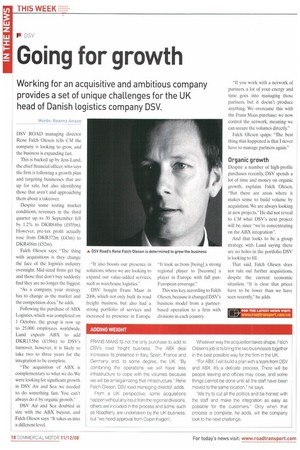Going for growth
Page 18

If you've noticed an error in this article please click here to report it so we can fix it.
Working for an acquisitive and ambitious company provides a set of unique challenges for the UK head of Danish logistics company DSV.
Words: Roanna Avison DSV ROAD managing director Rene Falch Olesen tells CM the company is looking to grow, and the business is expanding fast.
This is backed up by Jens Lund, the chief financial officer, who says the firm is following a growth plan and targeting businesses that are up for sale, but also identifying those that aren't and approaching them about a takeover.
Despite some testing market conditions, revenues in the third quarter up to 30 September fell by 1.2% to DKR8.6bn (1935m). However, pre-tax profit actually rose from DKR372m (£43m) to DKR456m (£52m).
Falch Olesen says: -The thing with acquisitions is they change the face of the logistics industry overnight. Mid-sized firms get big and those that don't buy suddenly find they are no longer the biggest.
"As a company, your strategy has to change as the market and the competition does," he adds.
Following the purchase of ABX Logistics, which was completed on 1 October, the group is now up to 25,000 employees worldwide. Lund expects ABX to add DKR13.5bn (i15bn) to DSV's turnover, however, it is likely to take two to three years for the integration to be complete.
"The acquisition of ABX is complementary to what we do. We were looking for significant growth in DSV Air and Sea: we needed to do something fast. You can't always do it by organic growth."
DSV Air and Sea doubled in size with the ABX buyout, and Falch Olesen says: "It takes us into a different level. "It also boosts our presence in solutions, where we are looking to expand our value-added services, such as warehouse logistics."
DSV bought Frans Maas in 2006, which not only built its road freight business, but also had a strong portfolio of services and increased its presence in Europe. "It took us from [being] a strong regional player to [become] a player in Europe with full panEuropean coverage."
This was key, according to Falch Olesen, because it changed DSV's business model from a partnerbased operation to a firm with divisions in each country. "If you work with a network of partners, a lot of your energy and time goes into managing those partners, but it doesn't produce anything. We overcame this with the Frans Maas purchase; we now control the network, meaning we can secure the volumes directly."
Falch Olesen quips: "The best thing that happened is that I never have to manage partners again."
Organic growth
Despite a number of high-profile purchases recently, DSV spends a lot of time and money on organic growth. explains Falch Olesen. "But there are areas where it makes sense to build volume by acquisition. We are always looking at new projects." He did not reveal to CM what DSV's next project will be, since "we're concentrating on the ABX integration".
And that looks to be a group strategy, with Lund saying there are no holes in the portfolio DSV is looking to fill.
That said, Falch Olesen does not rule out further acquisitions, despite the current economic situation. "It is clear that prices have to be lower than we have seen recently," he adds.




























































































































































